-
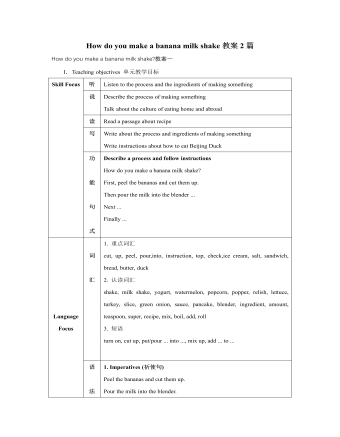
人教版新目标初中英语八年级上册How do you make a banana milk shake教案2篇
1. First, ... then, ... next, ... finally, ...首先,……然后,……接着,……最后,……这是英语中表达做某事的步骤的一种说法。如果步骤较多,还可以说:first-next-after that-later on-finally/at last通常你会听到说英语国家的人在说 first, next, then, finally 和后面的内容时,他们会做一些停顿。这样就能提前告诉听者接下来讲的是一系列的步骤。这一点在朗读和听力中应特别注意。2. how many, how much均为疑问词,同是“多少”,但用法不同。请看:how many修饰可数名词复数,how much修饰不可数名词。但在用法上,同学们常犯如下错误:1) [误] How many are there bananas on the table?[正] How many bananas are there on the table?[析] how many, how much 中的many,much是形容词,常修饰名词作定语,故后面跟名词。2) [误]How much tea are there on the table?[正]How much tea is there on the table?[析] how much修饰不可数名词时,谓语动词用单数。how many与how much的区别可简记为:前how many:问“多少”,复数名词后面跑;how much问“多少”,不可数名词单数好。前者答语用基数词,后者答语用数量关系。

人教版新目标初中英语八年级上册How do you get to school教案2篇
Step Ⅶ Role play ( Work on 1b)1. First ask two students to read the dialogue to the class.Sa: How do you get to school?Sb: Well, I ride my bike to the subway station. Then I take the subway.2. Now work with a partner.Suppose you use two kinds of transportation to get to school \Hangzhou\Beijing... (bus, train, subway, walking, bike, etc.) Tell how you get there. You may use the phrases in 1a.3. Then ask different pairs of students to present their conversations to the class.Step ⅧListening1. Work on 2a(1) First ask students to read the list of information that Thomas wants to know.…where Nina lives.…how far from school she lives.…how long it takes to get to school.…how she gets to school.…what she thinks of the transportation.(2) Tell students what transportation and bus stop mean.bus stop 汽车站 transportation n. 运送;运输Then tell students we'll hear a recording. Please put a checkmark in front of each thing that Thomas wants to know.(3) Now play the recording for students.( Have students pay attention to the sample answer.) (4) Then correct the answers.
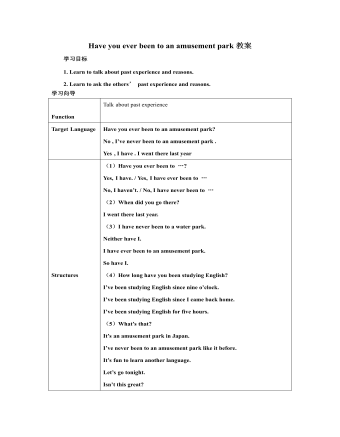
人教版新目标初中英语八年级下册Have you ever been to an amusement park教案
(1)Have you ever been to …? Yes, I have. / Yes, I have ever been to …No, I haven’t. / No, I have never been to …(2)When did you go there? I went there last year. (3)I have never been to a water park. Neither have I. I have ever been to an amusement park. So have I. (4)How long have you been studying English? I’ve been studying English since nine o’clock. I’ve been studying English since I came back home. I’ve been studying English for five hours. (5)What’s that? It’s an amusement park in Japan. I’ve never been to an amusement park like it before. It’s fun to learn another language. Let’s go tonight. Isn’t this great?space museum, amusement park, water park, South America, Peru, Holland, European culture, tour guide, flight attendant, musical instrument, more than, be from, get to, take lessons, neither, discover, graduate, change
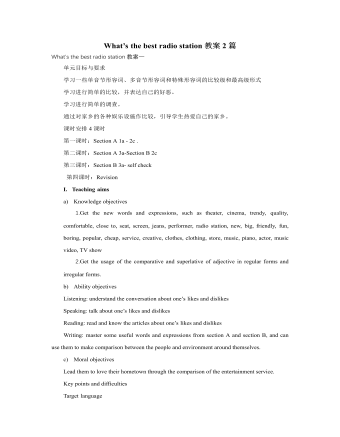
人教版新目标初中英语八年级上册What’s the best radio station教案2篇
教学重点和难点:运用所掌握的语言描述,比较不同地点的特点。在练习中学习掌握英语比较级和最高级的用法。课前准备分配小组,每组五至六人。通过上网或翻阅报刊杂志等方法,确定旅游线路,做出基本的旅游计划。教学设计:本节课流程图 学法指导:1.由于这是一堂新课,在教学中应注意面向全体,发挥学生的主体性,引导学生积极参与,激发学生的求知欲和学习积极性,指导学生积极思维,主动获取知识,养成良好的学习方法。逐步学会独立解决问题。总之要尽可能调动学生的非智力因素促进智力因素的发展。教法选择:1.电化教学法2.课堂讨论法3.任务型教学法采用这些方法的目的是为了充分调动学生的学习积极性,使学生变被动学习为主动学习。通过电脑形象的演示,加强印象,提高兴趣,突破难点,提高教学效率,进而增大教学的容量和信息量。充分体现教师为主导,学生为主体的教学原则。
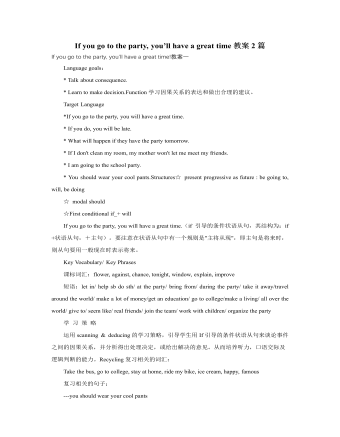
人教版新目标初中英语八年级下册If you go to the party, you’ll have a great time教案2篇
区分宾语从句、定于从句和状语从句宾语从句和状语从句,都叫做主从复合句。宾语从句主要是中考必考的,是初中阶段必掌握的从句,宾语从句主要是掌握三要素,所谓宾语从句,就是宾语在主从复合句当中充当宾语的一个句子,叫做宾语从句。主句的谓语动词是及物动词,后面如果是词或者是短语的话,是简单句,如果是句子的话,肯定是宾语从句。I know that he good at English.就是宾语从句,三要素,一要素是要注意连词,连词一共学了三类连词,一类连词是that口语当中可以省略,就像刚才说的那一句,I hear he is good at English.还有疑问代词、疑问副词,how where when,疑问代词、疑问副词。还有一类连词weather是否的意思,不是状语从句当中的如果,这一定要和如果区分开,这是是否。I don't know if he interested at English。宾语从句要注意if是连词。第二要素是语序,要用陈述举语序。比如说你家有几口人,我们都说How many people are there in you family?但是这是简单句,一旦说成宾语从句,你可以告诉我你家有几口人吗?Could you tell me how many people there are in you family ?
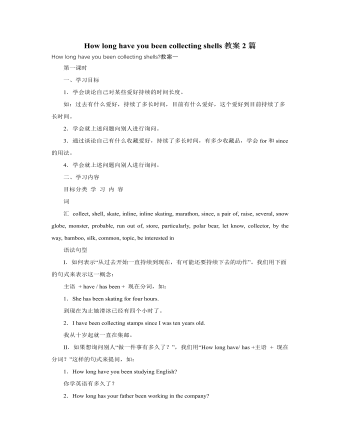
人教版新目标初中英语八年级下册How long have you been collecting shells教案2篇
Step Ⅱ Show the new words on the screen and teach the new words. Read the new words to students and ask them to repeat.Step Ⅲ 3aThis activity introduces new vocabulary and provides reading practice using the target language.In this activity first look at the four pictures.T: What can you see in the pictures?Ss: Four snow globes.T: Right. There are four snow globes in the pictures. And what are they?Ss: They are a monster, two polar bears, two penguins and a birthday cake.Write these words on the blackboard: snow globe; monster; polar bear; penguin and birthday cake. Read them to the class and ask students to repeat each one. Make sure students understand each word.Use a computer to show the E-mail message on the screen and read the message to students.Get students to read the e-mail on their own, and then draw lines connecting each snow globe and its description.Correct the answers.AnswersA line should connect each snow globe picture with the words that describe it in the letter.Step Ⅳ 3bThis activity provides writing practice using the target language.First review Activity 2a on Page 47.Then ask students to complete the message according to Activity 2a.Some partial sentences are given to students. Write about one person's collection.When students work, walk around the room checking the progress and offering help as needed.When they finish, ask some students to read their messages to the class.
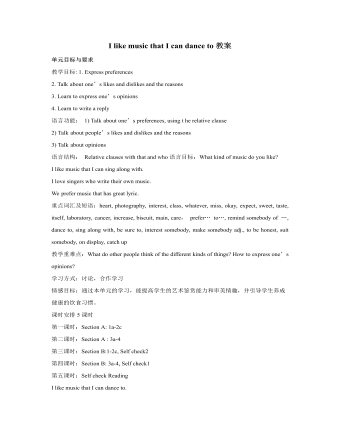
人教版新目标初中英语九年级上册I like music that I can dance to教案
教学目标: 1. Express preferences2. Talk about one’s likes and dislikes and the reasons3. Learn to express one’s opinions 4. Learn to write a reply 语言功能: 1) Talk about one’s preferences, using t he relative clause2) Talk about people’s likes and dislikes and the reasons3) Talk about opinions语言结构: Relative clauses with that and who语言目标:What kind of music do you like?I like music that I can sing along with.I love singers who write their own music.We prefer music that has great lyric.重点词汇及短语:heart, photography, interest, class, whatever, miss, okay, expect, sweet, taste, itself, laboratory, cancer, increase, biscuit, main, care, prefer… to…, remind somebody of …, dance to, sing along with, be sure to, interest somebody, make somebody adj., to be honest, suit somebody, on display, catch up教学重难点:What do other people think of the different kinds of things? How to express one’s opinions? 学习方式:讨论,合作学习情感目标:通过本单元的学习,能提高学生的艺术鉴赏能力和审美情趣,并引导学生养成健康的饮食习惯。课时安排5课时第一课时:Section A: 1a-2c第二课时:Section A : 3a-4第三课时:Section B:1-2c, Self check2第四课时:Section B: 3a-4, Self check1第五课时:Self check ReadingI like music that I can dance to.

人教版新目标初中英语九年级下册By the time I got outside, the bus had already left教案
Ⅰ. Teaching Aims and Demands1. Knowledge Objects(1) Key Vocabularyoversleep(2) Target LanguageWhat happened?I overslept. And by the time I got up, my brother had already gotten in the shower.2. Ability Objects(1) Teach the students to use the new words.(2) Train the students to narrate past events with the Past Perfect Tense.(3) Train the students' listening and speaking skills with the target language.3. Moral ObjectIt’s a good habit to go to bed early in the evening and get up early in the morning. So you’ll never be in a hurry in the morning.Ⅱ. Teaching Key Points1. Key Vocabularyoversleep2. Target LanguageNarrate past events with the Past Perfect TenseⅢ. Teaching Difficult Points1. Train the students to narrate past events with the Past Perfect Tense.2. Train the students to understand the target language in spoken conversation.Ⅳ. Teaching Methods1. Thinking of examples from the students' real lives.2. Making sentences by looking at the pictures.Ⅴ. Teaching AidA tape recorderⅥ. Teaching ProceduresStep I Revision1. Revise the language points in Unit 8.Ask some questions like this: What volunteer work would you like to do?Help the students to answer, I’d like to…/I love to…/I hope to2. Practice the dialogue in Activity 3c on page 62 again. Get students to role play the similar dialogues with the following.

人教版新目标初中英语九年级上册Where would you like to visit教案2篇
The First PeriodⅠ.Teaching Aims and DemandsKnowledge Objects(1) Key Vocabularytiring, educational, fascinating, thrilling, peaceful, exotic, trek, jungle, take it easy, explore, historic, site(2) Target LanguageWhere would you like to go on vacation?I’d like to trek through the jungle, because I like exciting vacations.2. Ability Objects(1)Train students to talk about places they would like to visit with the target language.(2)Train students to describe vacations with different adjectives.(3)Train students' listening skill.3. Moral Object,It′s more interesting to go on vacating somewhere instead of staying at home.Ⅱ. Teaching Key Points1. Key Vocabularytiring, educational, fascinating, thrilling, peaceful, exotic, trek, jungle, take it easy, explore, historic, site2. Target LanguageTalk about different places with the target language.Ⅲ. Teaching Difficult Points1. Describe vacations with different adjectives.2. Talk about different places with the target language.Ⅳ. Teaching Methods1. Teaching by illumination2. Teaching by doing chain drills3. Teaching by pairworkⅤ. Teaching Aids1. A tape recorder2. Some pictures of different places with famous views

人教版新目标初中英语九年级下册Rainy days make me sad教案
1. 教材分析本单元以how do things affect you?为话题, 从颜色、天气、音乐、广告、产品等方面谈论了外界事物如何影响人的心情。要求学生掌握表达某物或某事给人带来的感觉、看法或影响等。共设计了四个部分的内容:Section A 该部分有4个模块:第一模块围绕Which restaurant would you like to go to?这一话题展开思维(1a)、听力(1b)、口语(1c)训练;第二模块围绕How does music affect you? 进行听力(2a-2b)、口语训练(2c);第三模块继续围绕how do colors in the restaurant affect you这一话题展开训练,训练形式为阅读和问题体验(3a)和小组活动(3b);第四模块仍就How do things affect you这一话题以调查的形式展开讨论。Section B该部分有4个模块:第一模块围绕产品广告对人们的影响这一话题以“配对”(1a)与“列举”(1b)两种形式展开训练;第二模块继续围绕How do things affect you? 进行听力(2a-2b)、口语对话训练(2c);第三模块围绕“Advertising”这一话题展开阅读(3a-3b)和写作(3c)训练;第四模块围绕How posters affect you这一话题以口语训练形式展开小组活动。

人教版新目标初中英语九年级下册I’ll help clean up the city parks教案
Talk about offering help (P60)I’ll help clean up the city parks.A: I’d like to work ...B: You could help ...Talk about ways to tell people about the Clean-Up Day (P61)We need to ...We can’t ...I’ll ...Talk about the work the volunteers do (P62)These three students all volunteer their time to help other people.Somebody loves to ... / helps ... / plans to ... / wants to ...A: What do you like doing?B: I like ... A: What kind of volunteer work do you think I could do?B: You could ...1. 重点词汇advertisement, fix, repair, pleasure, blind, deaf, shut, carry, specially, fetch2. 认读词汇hunger, homeless, cheer, clean-up, sign, establish, major, commitment, elementary, veterinarian, coach, similar, call-in, strategy, disabled, organization, unable, support, appreciate, donation, part of speech, pronoun, adverb, preposition, conjunction, donate, Jimmy, Sally3. 词组clean up, cheer up, give out, put off, set up, think up, take after, fix up, give away, put up, hand out, work out, at once

人教版高中历史必修1明清君主专制的加强教案
对于教材最后一段内容,设计如下一个课堂研讨题。让学生课前查找有关资料,在主动获取知识的过程中,对比17、18世纪中国和欧洲的历史,了解为什么会出现不同的发展趋势?【课堂研讨】17、18世纪中国和欧洲的封建国家都进行了加强君主专制的改革措施。如东方有康熙大帝,西方有路易“太阳王”,他们都使中、法两国进入到封建的鼎盛时代。但改革却在中国和欧洲产生了不同影响。这是为什么?通过网络或有关论著,查找有关资料让学生发表自己的观点和看法。启示:17、18世纪的中国在政治上空前强化君主专制,在经济上重农抑商,在外交上闭关锁国,影响了中国资本主义萌芽的正常发展;文化上文字狱,禁锢了文化。17、18世纪的欧洲在政治上加强君主专制来反对罗马教廷的控制,却实行君主开明专制;在经济上实行重商主义;在外交上鼓励对外扩张,促进了资本主义在欧洲的发展;文化上,启蒙思想蓬勃发展。

人教版高中历史必修2战后资本主义的新变化教案2篇
1、知识与能力:(1)识记:20 世纪 50 ~70 年代国家干预经济的政策、 70年代的经济“滞胀”“混合经济”;福利国家;第三产业的蓬勃发展;“新经济”的出现;(2)理解当代资本主义的新变化的实质是资本主义的自我扬弃,是在资本主义内部的自我改善,是资本主义生产关系的自我调整;(3)掌握以美国为代表的主要资本主义国家在战后的经济发展历程,分析各国经济发展的共同原因。2、过程与方法:(1)引导学生利用教材和相关史料,培养归纳、再现历史事件的能力,提高学生的历史思维能力;通过讨论提高学生的思辨能力,培养学生全面客观地分析问题的思维方式。(2)学生通过观察1977年发达国家国有经济比重表,懂得提取有效信息、分析数据的能力;(3)学生通过思考讨论西方福利制度的利弊,培养全面、客观分析和比较历史现象,辩证地观察和分析历史问题的能力。
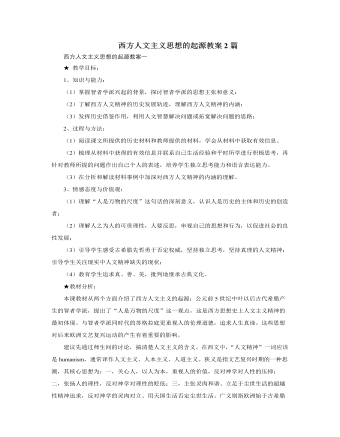
人教版高中历史必修3西方人文主义思想的起源教案2篇
在当时雅典的公民大会和陪审法庭上,人们常常要发表意见,要和自己的对手辩论,雅典法庭规定每个公民须替自己辩护,不许旁人代辩。所以出现了这样一批专门教授人辩论、演说、修辞的技巧和参政知识的职业教师。①政治因素:雅典奴隶制民主政治发展到顶峰,成为希腊政治和文化中心。参与政治生活成为每个公民生活的重要内容②古希腊工商业发展,奴隶制经济繁荣(在广大奴隶的劳动基础上,古希腊的经济迅速发展起来,为哲学的成长提供了物质条件)——根本原因③人的地位的提高(民主政治制度和每个公民参与政治意识的加强,使人的中心地位日益突出)最后教师强调:提示并强调学生学习时要注意理解“一定的文化是一定社会的政治和经济在观念形态上的反映”。3、代表人物:普罗泰格拉4、研究领域:人和人类社会关注人与人之间的关系、社会组织、风俗习惯和伦理规范
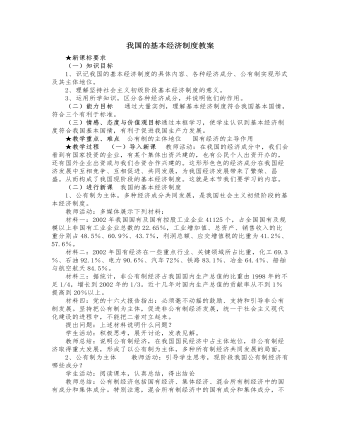
人教版高中政治必修1我国的基本经济制度教案
(3)外资经济 教师活动:外资经济是指外国投资者和港澳台投资者根据我国法律法规,在我国大陆设立的独资企业以及中外合资企业、中外合作企业中的外商投资部分。他有利于引进外资和先进技术,学习境外先进管理经验,有利于扩大就业、扩大出口,增加财政收入。 提醒学生注意中外合资企业、中外合作企业中的外商投资部分,不是指中外合资企业、中外合作企业全部资产。并简略介绍中外合资企业与中外合作企业的区别。(4)非公有制经济的地位 是社会主义市场经济的重要组成部分。教师点拨:请同学们注意比较,非公有制经济的地位与前面集体经济的地位有什么不同?学生活动:积极思考,回答问题教师点拨:集体经济的地位,是社会主义公有制经济的重要组成部分。社会主义公有制经济与社会主义市场经济这两个说法是不同的。(简单了解即可)4、为什么坚持以公有制为主体,多种所有制经济共同发展
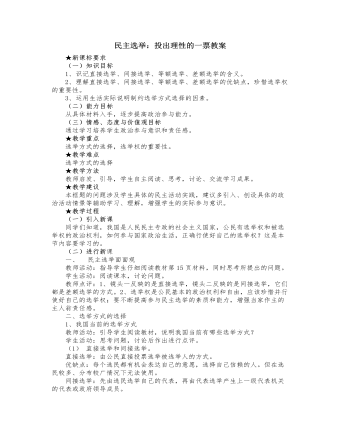
人教版高中政治必修2民主选举:投出理性的一票教案
教师活动:那种“选举与我无关”,“选谁都可以”的想法,是公民意识不强、主人翁意识不强的表现。那么,怎样才能行使好自己的选举权呢?请同学们根据上面的学习,谈谈自己的想法。学生活动:思考讨论教师点评:2、 如何行使好自己的选举权(1)要不断提高自己参与民主选举的素养,端正参加选举的态度,提高选举能力,选出切实能代表人民利益的人。(2)要增强主人翁责任感和公民参与意识,积极参加选举,认真行使自己的选举权。(3)要不断提高政治参与能力,在理性判断基础上,郑重投出自己的一票。(三)课堂总结、点评本节内容讲述了我国的选举方式以及如何珍惜自己的选举权利的有关知识,懂得我国是人民民主专政的社会主义国家,人民当家作主,应该增强主人翁责任感,自觉珍惜并运用好选举权,以促进我国的民主政治建设,维护人民的根本利益。
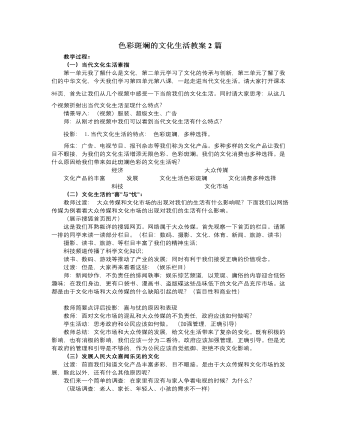
人教版高中政治必修3色彩斑斓的文化生活教案2篇
六、学习效果评价设计1、评价方式:我对学习效果的评价,来自两个方面。一是教师的教授是否认真、严肃、科学;二是学生的学习成果如何,是否达成了事先预设的教学目标,是否在学习过程中有提高的过程。评价的方式有:同伴评价;教师自我评价和反思;学生反馈。2、评价量规:我设置了几个问题用于课后的教学评价:(1)教学目标是否符合课标要求,是否符合三贴近原则,是否体现学生学习效果的生成性和过程性。(2)学习所用资源是否来自生活实际,是否真实,是否是学生感兴趣的问题。(3)教师在课堂教学过程中是否能有效的通过提问和资料的展示分析,引导学生自己生成思考过程,而不是“教师代替学生的思考”。(4)学生参与的广度和态度,学生是否提出有意义的观点和问题。学生的回答是否是实话。
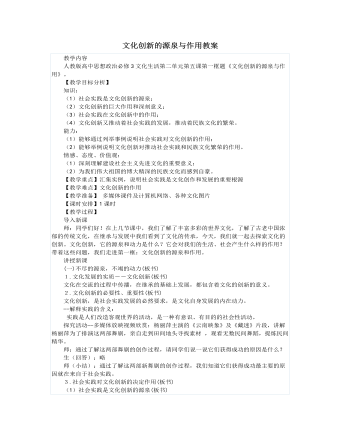
人教版高中政治必修3文化创新的源泉与作用教案
(三)呼唤文化创新的时代(板书)1.人民群众是文化创造的主体--(板书)师:【图片文字展示】--《离骚》、《九歌》、《水浒传》、《三国演义》均取材自民间,在民间口述文字的基础上加工形成,所以,我们可以看到,文化创新的主体是谁?生:人民群众是文化创造的主体师:在新的历史时期,我们的青少年应该怎么做?生:虚心向人民群众学习,从人民群众的伟大实践和丰富多彩的生活中汲取营养,这是当代中国文化工作者的使命和职责。2.文化工作者必须坚定地走与人民群众的实践相结合的道路--(板书)3.当代中国文化创作者的使命和职责。(板书)【课堂小结】通过本节课的探究学习,我们认识到文化创新的源泉和作用,要求我们虚心向人民群众学习,从人民群众的伟大实践和丰富多彩的生活中汲取营养,刻苦钻研,锐意创新,为全面建设小康社会而奋斗。
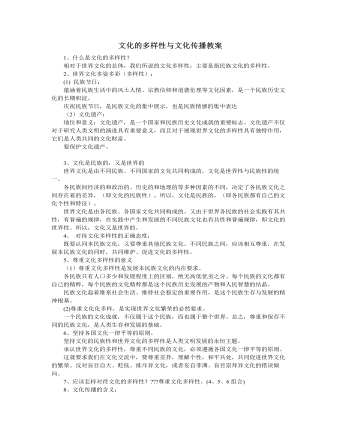
人教版高中政治必修3文化的多样性与文化传播教案
8、文化传播的含义:文化交流的过程,就是文化传播的过程。 人们通过一定的方式传递知识、信息、观念、情感和信仰,以及与此相关的所有社会交往活动,都可视为文化传播。9、文化传播的途径(1)商业活动。商人进行贸易活动时,不仅通过商品交换将商品中蕴涵的丰富文化加以交流,而且通过人与人之间的交往过程交流文化。(2)人口迁徙。每一次大规模的人口迁徙,都意味着大规模的文化传播,都会对当时当地的经济、政治、文化产生极大的影响。(3)教育教育是文化传播的又一重要途径。人们通过学习各种文化课程,能够获得不同的文化知识。文化传播是教育的重要功能。10、大众传媒:现代文化传播的手段现代社会中的传媒有报刊、广播、电视、网络等多种形式,这类传媒被称为大众传媒。依托现代信息技术,大众传媒能够最大程度地超越时空的局限,汇集来自世界各地的信息,日益显示出文化传递、沟通、共享的强大功能,已成为文化传播的主要手段。
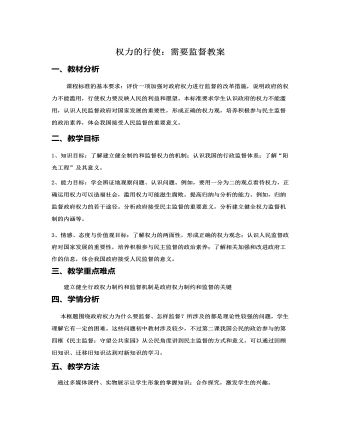
人教版高中政治必修2权力的行使:需要监督教案
一、教材分析课程标准的基本要求:评价一项加强对政府权力进行监督的改革措施,说明政府的权力不能滥用,行使权力要反映人民的利益和愿望。本标准要求学生认识政府的权力不能滥用,认识人民监督政府对国家发展的重要性,形成正确的权力观,培养积极参与民主监督的政治素养,体会我国接受人民监督的重要意义。二、教学目标1、知识目标:了解建立健全制约和监督权力的机制;认识我国的行政监督体系;了解“阳光工程”及其意义。2、能力目标:学会辨证地观察问题、认识问题。例如,要用一分为二的观点看待权力,正确运用权力可以造福社会,滥用权力可能滋生腐败。提高归纳与分析的能力。例如,归纳监督政府权力的若干途径。分析政府接受民主监督的重要意义,分析建立健全权力监督机制的内涵等。

